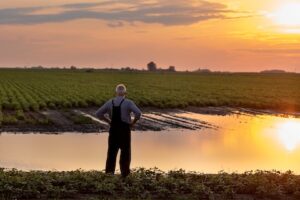AMES, Iowa – A study conducted by researchers at Iowa State University investigates the psychological and social impacts of potentially traumatic experiences on Iowa farmers. The study, titled “The Effects of Collective Trauma on Iowa Farmers, Their Communities and Sustainability Outcomes,” was published in a special issue of the journal of Agriculture and Human Values. This issue focuses on the social and economic needs of farm households and the future of agriculture, and it is available online.
Collective trauma refers to psychological effects that are experienced by a group of people in response to shared traumatic conditions. While previous research has examined aspects of individual farmer stress, this study is the first to specifically examine trauma among farmers and the effects it can have on their families and communities.
“Research on farmer stress is important, but some experiences that farmers and their communities face go beyond being stressful to the point of being traumatic. This type of experience can have long-lasting negative impacts at the individual and community level,” noted Chris Morris, postdoctoral research associate in the Department of Sociology and Criminal Justice at Iowa State University and lead researcher on the project.
The research project conducted interviews with farmers and behavioral health experts, focusing on the lived experiences of farmers who have faced potentially traumatic experiences. Farmers identified several traumatic experiences and conditions, including extreme weather events, rapidly fluctuating markets, trade wars, rising input costs, dependence on government programs, the threat of farm bankruptcies, the 1980s Farm Crisis and high rates of farmer suicides.
According to the farmers and behavioral health experts interviewed, these conditions can have significant long-term effects on individual farmers, their families and their communities. On an individual level, farmers can experience poor mental health outcomes like anxiety, depression and post-traumatic stress disorder, while at the community level, there is an observable breakdown in trust, diminishing group cohesion and eroding community social structures.
The study also found that traumatic experiences unique to farming can impact farmer decision-making, which can have complicated and cyclic effects on the environmental, economic and social sustainability of farming communities and the land they farm.
“An important takeaway from this research is that while many aspects of farming are fun and rewarding, there are also some parts that can be really tough on farmers’ families and friends,” noted J. Arbuckle, ISU Extension and Outreach sociologist and investigator on the project. “The results highlight a need for policies and programs that consider dynamics in the agricultural system that can negatively impact the well-being of farmers and their communities.”
Chris Morris can be reached at cmorris@iastate.edu.










